Conference Summary by UUJEC
Washington DC, September 15-September 17
- For more on UUSJ’s: Advocacy Corps program, Write Here! Write Now! program or issue Priorities.
- See the speaker agenda.
- View a blog post by our partner UU Ministry for Earth.
- Read an account in UU World by participant Lily Hartzell
- Photos of conference activities HERE and HERE.
What We Did – Create Climate Justice: Building a Movement for a Green New Deal
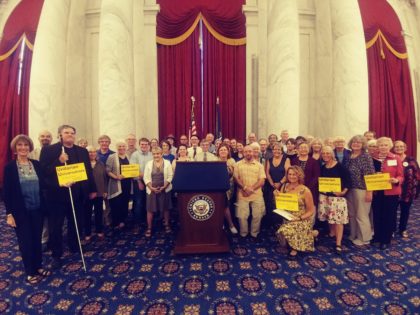 For three days UUs and friends gathered in Washington, DC, for inspiration, outreach, education, and action on the climate emergency and the need for climate justice. We came from all over the country at a critical moment, a few days before the global Climate Strike and the start of the United Nations Climate Conference.
For three days UUs and friends gathered in Washington, DC, for inspiration, outreach, education, and action on the climate emergency and the need for climate justice. We came from all over the country at a critical moment, a few days before the global Climate Strike and the start of the United Nations Climate Conference.
The conference was the result of cooperation from all corners of the UU world, and that is itself one of the most important takeaways—this is a challenge we all acknowledge cannot wait and that requires us to work together. At this year’s General Assembly we passed an Action of Immediate Witness, “Build the Movement for a Green New Deal,” that called on us to “rebuild our political and economic structures to prioritize the well-being of future generations.” This conference was a contribution to that goal.
On Day One almost 150 of us gathered at All Soul’s to hear messages of faith and inspiration. On Day Two we met at St. Mark’s Episcopal on Capitol Hill to discuss the Green New Deal (GND) and hear from partners in this effort. And on Day Three we went to the offices of over 50 US Senators to carry our message about the need for a just transition to a fossil fuel free world.
We can’t do justice to all the great speakers and conversations, but here are some of the highlights.
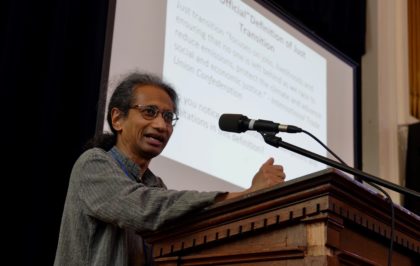
Inspiration. We lifted ourselves up by hearing from fellow UUs who are doing the work of creating climate justice. Their example tells us that our values and our faith need to be active in the world, and can sustain us in this difficult work.
- UU Ministers Rob Hardies, Dr. Rob Keithan, and Amanda Weatherspoon; Paula Cole Jones from UUA’s Central East Region; Senowa Mize-Fox with the Climate Justice Alliance; Bev Harp, a UU and leader in the DC Sunrise Movement; Pablo DeJesus from Unitarian Universalists for Social Justice; Aly Tharp from the UU Ministry for Earth; and UUA President Susan Frederick Gray (via recorded message) made clear how our UU values call us to respond to the climate crisis, and gave us wonderful examples of how we can make a difference.
- Reverend Susannah Tuttle, Director of North Carolina Interfaith Power and Light, urged us to make sure the GND contains the moral ‘must-haves’ captured in the “Faith Principles for a Green New Deal,” including compassion and fairness towards workers and communities dependent on fossil fuels, and “sacred dialogue” across political, geographic, racial and cultural boundaries. She instructed us to go home and “work from your corner” by mapping our local communities and their resources.
- We heard Levi Draheim, a charismatic 12-year old UU from Florida, describe how his love for his barrier island home led him to become active in the climate movement. Levi is the youngest plaintiff in a constitutional lawsuit, Juliana vs. US, that accuses the US government of shirking its constitutional duty to protect fundamental rights.
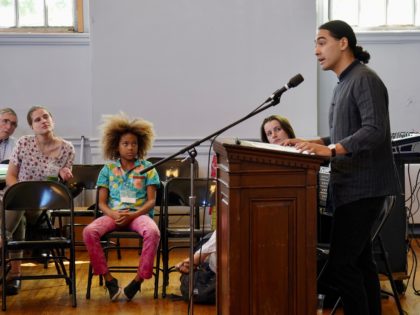
Partnering. Creating climate justice requires working with people on the front lines of the climate crisis. At the conference we heard from people who expanded our horizons.
- Julian Brave Noisecat, a member of the Canim Lake Band Tsq’escen, told us the GND must honor the earth and be built with and for indigenous communities. The struggle against the Dakota Access and Keystone pipelines continues.
- Reverend Leo Woodberry, pastor of Kingdom Living Temple in South Carolina and a Sierra Club activist, described the plight of poor African-American families living near the coast whose houses need to be elevated in the face of recurrent flooding.
- Alison Hirsh, policy director at the Service Employees International Union, explained why the poor, minority members of her union voted to support the GND: because from their experience at the bottom, they know we need systematic economic change. Her advice: even though today’s politics are inhospitable, keep educating and planning, so that when the tide shifts, you’re ready.
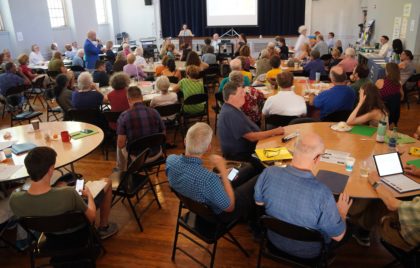
Education. Effective action rests on a solid understanding of the complex political, economic, and social environment that we need to change.
- Basav Sen from the Institute for Policy Studies helped us think through the complexity of today’s climate challenges, including the positions of key countries. Canada and Australia, for instance, are both huge energy exporters and will be reluctant to take measures that are sure to be unpopular at home.
- Julian Brave Noisecat put on his hat as Director of Green New Deal Strategy at the think tank Data for Progress to tell us why we need a mass movement that is combined with disciplined organization. He urged us not to waste time trying to win over skeptical politicians, but to pursue an ‘outside-in’ strategy to pressure lawmakers by making the GND big and popular. Think tanks, academic experts, and congressional staff are fleshing out the GND and starting to put together specific pieces of legislation. Elected officials need to hear now from everyone, not just young people.
- Emily Wirzba from the Friends Committee on National Legislation, and Ruth M. Ivory-Moore, Program Director for Environment and Energy for the Evangelical Lutheran Church in America, ran down the political state of play. While the near-term picture is bleak, they advised us to shape a positive narrative about the climate crisis and the GND to give people hope. There are some encouraging signs: the US is still in the Paris Agreement and the House passed a bill prohibiting us from leaving; there is a new bipartisan Senate caucus on climate; and so far six bills have been introduced to put a price on carbon, and several of them have bipartisan support.
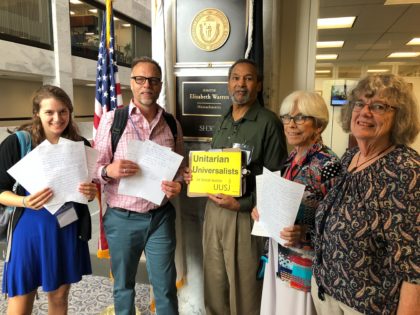
Action. After UUSJ instructed us in the best practices of effective advocacy, on Tuesday conference-goers joined local members of UUSJ’s Advocacy Corps and fanned out to over 50 Senate offices. They carried 990 letters from 35 UU congregations around the country—yeah for you!—with clear messages:
- For the sake of our children and grandchildren, and the health of our planet, transform our economy to net-zero carbon pollution by 2050.
- Implement a just transition that respects indigenous peoples and protects the jobs and communities impacted by change.
- Act now to extend tax credits for solar and wind energy, establish a realistic price for carbon, and fund projects to increase climate resilience in the new Highway Bill.
After this, the Senate can have no doubt about where UUs stand and how passionate we are about this issue!
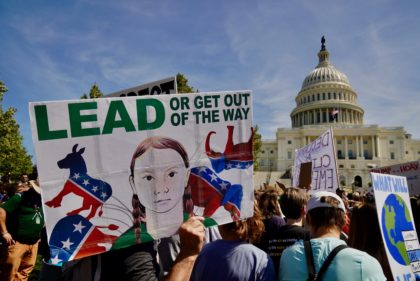 Conclusion. What did we hear during our three days? A lot, but above all this:
Conclusion. What did we hear during our three days? A lot, but above all this:
- The tide is turning! Youth activism, enthusiasm for the GND, and the reality of our warming planet are having an impact. Leaders and politicians are starting to take notice.
- UUs can make a difference. What we say, and do–and who we do it with—really matter. If we unite in justice and move in the same direction, we are mighty. (A good place to start is here: Create Climate Justice. Watch for more follow-up from the conference.)
- Work hard, work now, work at every level. Tomorrow is too late. The future is being decided today. Everything we do, whether in states or in Washington, in our congregations or in the streets, should work together and be reinforcing.
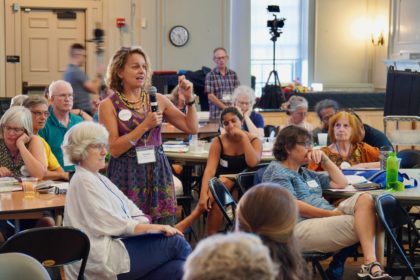
Yours in Love and Justice
- UUJEC – Unitarian Universalists for a Just Economic Community
- UUSJ – Unitarian Universalists for Social Justice
- UUMFE – Unitarian Universalist Ministry for the Earth
- UUA – Unitarian Universalist Association
- UUSC – Unitarian Universalist Service Committee
- ASCU – All Souls Church, Unitarian
- SWL – Side With Love
Adam Wasserman
Board Member, Unitarian Universalists for a Just Economic Community
former UUSJ Board Member for UUC Fairfax, VA

